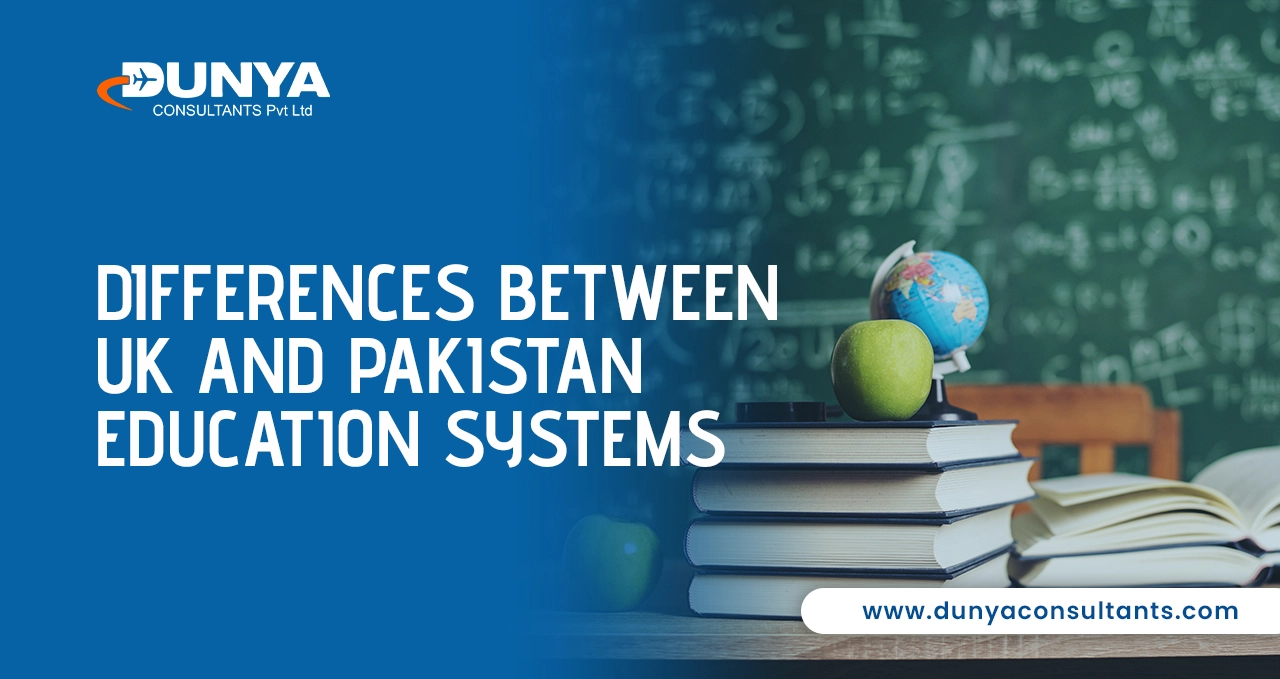Education is very important for the progress of a country. Good education helps a country to grow and flourish. When more people can read and write, the country becomes richer and stronger. Educated individuals help build strong nations by working in fields like politics, engineering, medicine, business, and more. Their work benefits their country and even the whole world. In Pakistan, the literacy rate is approximately 58.9%, according to Relief Web.
For parents as well as students, understanding education system differences can be difficult, especially when comparing different countries. Today, we will discuss differences between UK and Pakistan education systems. The United Kingdom is one of the best and most respected in the world. How does it compare to the Pakistan education system? Each has its own advantages. Knowing these differences will help you make better choices for your education.
Education System Comparison of Pakistan & UK
Pakistan’s education system has three main levels: elementary (grades one to eight), secondary (grades nine to twelve), and higher education (after grade twelve). In the United Kingdom, education starts with the Early Years Foundation Stage (EYFS), which begins at age four in Reception class. Let’s discuss about UK vs Pakistan education system below:
Primary and Elementary Education
In Pakistan, children usually start primary or elementary school at the age of five or six. In rural areas, some children start even later. One of the major UK study benefits is that children begin school earlier, at age four, but starting at age five is not compulsory everywhere.
The primary UK education structure is divided into two stages: Key Stage 1 (ages 5-6) and Key Stage 2 (ages 7-11). Scotland has no middle schools, and primary education lasts seven years. In England, it lasts six years, followed by middle school.
Secondary Education
In Pakistan, the duration of secondary education is around four years, from grades 9 to 12. It is provided in government schools and colleges across all provinces. In the UK, secondary education is for people of 12-16 or 12-17 years old. Students usually complete A-levels by age 18.
Education is mandatory for ages 14-16 in the UK, but in Pakistan, education is not compulsory at any level. The UK education curriculum also has more resources compared to Pakistan’s state schools.
Higher Education
In Pakistan, higher education begins after grade 12, in colleges as well as universities managed by the provincial government and the Higher Education Commission. Similarly, in the UK, students enter universities or professional colleges after secondary education.
UK degree programs vary in length: three years in England for a full-time degree, and four years in Scotland for an Honors degree. Part-time degrees may take longer, around five years.
Conclusion
Every education system whether the UK or Pakistani has its own strengths. The UK education reforms focus on specific subjects which is great for students who want to specialize. The Pakistan education policies is more structured but relies a lot on exams. Choosing the best system depends on what works for the student, their goals, as well as the kind of learning environment they prefer. Understanding these differences between UK and Pakistan education systems can help you pick the right system.
FAQs
How can I Study in UK from Pakistan?
To study there, you need to meet UK university admission requirements Pakistan. This requires an offer from a UK university, English language proof, etc.
What is UK academic calendar vs Pakistan?
The UK academic year is from September to August with three terms: Autumn, Spring, and Summer. In Pakistan, it is April to March, except for grades 11 and 12, which follow September to June.
What are Pakistan education challenges?
Pakistan’s education system has many challenges. Schools are not easily accessible, and public education quality is often poor. Teachers lack proper training and resources.
Is the UK education structure better than Pakistan?
The UK education system is often seen as better than Pakistan’s, but both systems have differences. The quality of education can vary based on the school and the student.












